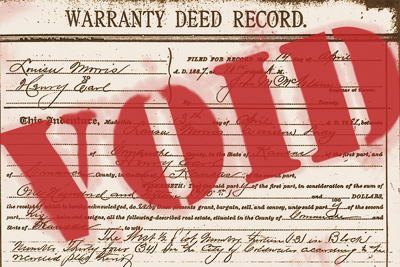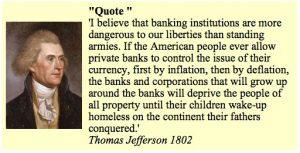The Story of A Judge Who Was Poisoned After Ruling Bank Foreclosure Is Illegal and All Mortgages Are Null and Void
Stacy Flanagan
 Judge Martin Mahoney wrote the following about a case he ruled over, The First National Bank of Montgomery v. Jerome Daly, December 7, 1968: (See 17 Am. Jur. 85, 215, and 1 Mer. Jur. 2nd on Actions, Section 550) Judge Martin Mahoney wrote the following about a case he ruled over, The First National Bank of Montgomery v. Jerome Daly, December 7, 1968: (See 17 Am. Jur. 85, 215, and 1 Mer. Jur. 2nd on Actions, Section 550)
"There is no lawful consideration for these Federal Reserve Notes to circulate as money. The banks actually obtained these notes for the cost of printing. A lawful consideration must exist for a note...
"The activity of the Federal Reserve Banks...and the First National Bank of Montgomery, is contrary to public policy and contrary to the Constitution of the United States, and constitutes an unlawful creation of money and credit for no valuable consideration. Activity of said banks in creating money and credit is not warranted by the Constitution of the United States.
"The Federal Reserve Banks and National Banks exercise an exclusive monopoly and privilege of creating credit and issuing notes at the expense of the public, which does not receive a fair equivalent. This scheme is obliquely designed for the benefit of an idle monopoly to rob, blackmail, and oppress the producers of wealth [you and me and our ability to work and be productive].
"The Federal Reserve Act and the National Bank Act are, in their operation and effect, contrary to the whole letter and spirit of the Constitution of the United States, for they confer an unlawful and unnecessary power on private parties; they hold all of our fellow citizens in dependence; they are subversive to the rights and liberation of the people.
"These Acts have defied the lawfully constituted Government of the United States. The Federal Reserve Act and National Banking Act are not necessary and proper for carrying into execution the legislative powers granted to Congress [See Article 1, Section 8, Clause 5 of the Constitution of the United States] or any other powers vested in the government of the United States, but on the contrary, are subversive to the rights of the People in their rights to life, liberty, and property...
"No rights can be acquired by fraud. The Federal Reserve Notes are acquired through the use of unconstitutional statutes and fraud. The law leaves wrongdoers where it finds them. Slavery and all its incidents, including peonage, thralldom, and the debt created by fraud is universally prohibited in the United States. This case represents but another refined form of slavery by the bankers. Their position is not supported by the Constitution of the United States."
Two weeks after Judge Mahoney ruled in favor of Daly, and wrote the above, he was assassinated.
With the advent of the internet in the eighties and knowledge no longer being restricted to well-controlled sources one of the things that I discovered was the facts about the way money works in this world. We’ve all heard the various sayings about 5% of the world’s population holding 95% of the world’s wealth but not many are sure how and why this is our reality.
Doing some online research about what is money and how is it created will inevitably lead one to discover the surprisingly fraudulent ways in which banks create money and make loans. Because the world’s banking systems, as they exist now, continue to cause pain and suffering in generation after generation of mankind I consider this insidious “con-job” of a banking and monetary system to be the greatest crime against humanity.
The Case of Jerome Daly vs The State of Wisconsin
In this case, Jerome Daly defended himself against a lawsuit brought by a bank holding the mortgage on his house. Mr. Daly had defaulted on the mortgage and the bank was suing to foreclose and take his house.
Unfortunately for the bank, even though it was 1969 and all good little citizens were doing as they were told, never daring to question any kind of authority, Mr. Daly was well educated in the way banks create money. Mr. Daly knew that when a bank makes a loan, it instantly creates money by the stroke of a pen in a ledger, which then is transferred to the borrower’s account.
Mr. Daly, also being a lawyer knew very well about the “Law of Consideration” meaning, essentially, that a contract was null and void if both parties are not exchanging something of inherent value.
Mr. Daly argued, and somehow got the bank to admit, that they created the money with a stroke of a pen at the time of the loan (and that there was no actual official law empowering them to do so.) Since the bank did not “put up” anything of value (other than the ink from the pen) for Mr. Daly’s home mortgage, there was no consideration, therefore the mortgage agreement was null and void.
Justice Martin V. Mahoney ruled against the bank and denied the foreclosure. Mr. Daly kept his house and paid no more mortgage. Six months later Justice Mahoney was found dead (allegedly by poison) and Mr. Daly was disbarred and never practiced law again.

Here is a brief summary of the facts:
- Jerome Daly had a mortgage with the First National Bank of Montgomery , Minnesota .
In Spring 1967, he was $476.00 in arrears, the bank foreclosed and bought the property at a Sheriff’s sale on June 26, 1967.
The bank sued for possession.
- A jury trial presided over by Martin V. Mahoney, Justice of the Peace, Credit River Township , Scott County, Minnesota, was held on December 7, 1968.
- The bank’s president, one Lawrence V. Morgan (familiar name?) appeared along with lawyer R. Melby for the plaintiff and Jerome Daly, who was a lawyer, appeared on his own behalf.
In other words:
“The Credit River Decision,” which is, still “The Law of the Land” declared the following
- the Federal Reserve Act is unconstitutional and VOID
- the National Banking Act is unconstitutional and VOID
- the mortgage acquired by the First National Bank of Montgomery, Minnesota in the regular course of its business, along with the foreclosure and the sheriff’s sale, to be VOID
Most people in this country have been led to believe that the money loaned by the bank is from the deposits of the banks customers. The more money the public saves, the more it can use that money to lend. In a way, the banks slide of hands accomplishes this task by creating your deposit based on the note you sign and then lending it back as if it was already on the books.

Stacy is a former paralegal turned activist with a unique perspective on the inner workings of government and healthcare. She is a freelancer and stays home with her four-year-old toddler. She is in love with all things metaphysics and spirituality and finding the connections between science and religion. Her main objective is to help raise the consciousness of humanity any way she can.
www.dtss.us
| 



